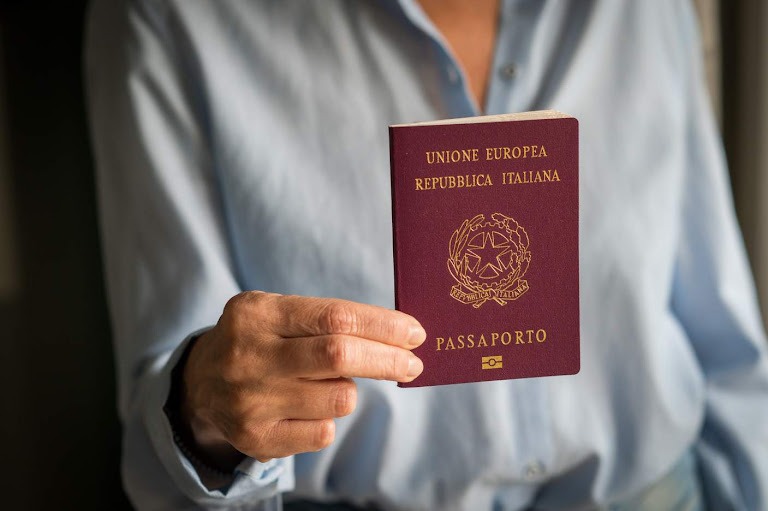Thursday, 14 August 2025
Jure sanguinis: applying in Italy for citizenship
If your family came from Italy, you might have the right to reclaim citizenship through your bloodline. Jure sanguinis is about proving that connection and applying directly in Italy instead of waiting years at a consulate.
This method can be quicker, but it requires clear documents and sometimes even a court case. Understanding the Italian citizenship law before you go can save time, stress, and money.
Understanding Jure Sanguinis in Italy
Definition and historical context
Jure sanguinis means “by right of blood.” It’s a rule in Italian nationality law that allows people to claim Italian citizenship through their Italian ancestry.
Italy has followed this rule since unification in the 1860s. It doesn’t matter where you were born. What matters is whether your family kept the legal link to Italy.
Ancestral link requirements
To qualify, you must have at least one Italian-born ancestor who passed on their citizenship to the next generation. This could be your Italian parent, grandparent, great-grandparent, or even further back.
The link must be direct and uninterrupted. If your ancestor gave up their foreign citizenship before the next person in the line was born, the chain breaks.
No renunciation clause and unbroken lineage
The Italian ancestor must not have renounced citizenship before their child was born. If they became a foreign citizen too early, your claim might be blocked.
This is often checked through the naturalization certificate. If your great-grandfather became an American in 1915 but your grandfather was born in 1910, you’re still eligible. If the dates were reversed, you’d likely be disqualified.

Key eligibility criteria and specific scenarios
“1948 Rule” for Maternal Lineage
Italy only allowed men to pass down citizenship until January 1, 1948. If your claim goes through a female ancestor and the next child was born before that date, you’ll need to take legal action.
In these cases, you can’t apply through an Italian municipality or consulate. You must file a case in an Italian court, usually through a lawyer.
Many people win these cases, but it takes time and legal fees. Still, it’s the only way forward for many families.
Generational limits and recent legislative changes
Recent changes to Italian citizenship law, introduced by Decree-Law No. 36/2025 and now converted into Law No. 74/2025, have severely restricted the recognition of citizenship “jure sanguinis.” The new rules limit eligibility to descendants within two generations from the Italian-born ancestor, and introduce further obstacles such as the requirement to prove an ongoing, substantial connection (“genuine link”) to Italy. These measures apply retroactively and exclude countless individuals—especially those in the third generation and beyond—regardless of how long they’ve been preparing their applications.
Although exceptions exist for those who had already secured consular appointments by March 27, 2025, these protections are extremely narrow and risk creating unjustified disparities among applicants, based merely on technical factors like access to the flawed “Prenot@mi” booking system.
If your case involves a distant ancestor or if you have never lived in Italy, it is strongly advised not to delay. Filing a court petition now is the only way to preserve your eligibility. The decree’s constitutionality is expected to be challenged, and if overturned, only those who filed in time will benefit. Waiting could result in permanent exclusion—even if your right to citizenship would otherwise be constitutionally protected
Other pathways: Marriage, Naturalization, Birthright, Special Contributions
Marriage to an Italian citizen can lead to citizenship after a set time—usually two years if living in Italy, or three if abroad. You must also pass a B1 Italian language exam.
You can apply for Italian citizenship through naturalization if you have lived in Italy legally for 10 years. You’ll need proof of income, housing, and a clean legal record.
People born in Italy to foreign parents may qualify, especially if they’ve lived there most of their lives.

The Application Process for Jure Sanguinis Applying in Italy
Advantages and disadvantages of each path
You can apply through your appropriate Italian consulate. This route is easier logistically, but the wait is long—sometimes 3 to 5 years.
In contrast, filing a court petition for a jure sanguinis (citizenship by descent) is often faster, more predictable, and does not require relocation—making it the preferred route for most eligible applicants today.
If your case falls under the “1948 rule,” you’ll need to skip the comune and go straight to court. These cases always need a legal process.
1. Essential document gathering and preparation
Required documents
You must gather birth certificates, marriage certificates, death certificates, and naturalization documents for every person in your direct line—from your Italian ancestor to you.
Each document must be a long-form version showing full names, dates, and places. In some cases, you may need baptism records or census data if civil records don’t exist.
Authentication and translation
Every non-Italian document must have an apostille stamp. This proves it’s official and ready for international use.
Then, you need to translate the vital records into Italian. Use a certified translator who knows how to format legal records.
Most Italian comunes will reject poor translations or uncertified documents, which can delay or block your application. Always double-check your paperwork before traveling.
At Aprigliano Law Firm, we also offer professional translation and court-certified (asseverated) services, ensuring your documents meet all legal requirements. The apostille is essential—make sure your documents are legalized before we proceed with translation.
Addressing discrepancies and inconsistencies
If names or dates don’t match between documents, you’ll need to explain the differences. Some comunes are strict about even small mistakes.
For example, if your ancestor’s name is listed as Giovanni in one record and John in another, you may need a legal affidavit.
You might also need court orders to fix bigger issues. This can take time, so handle it early.
2. Understanding fees and processing times
Non-refundable application fees
There’s a €600 Court fee per adult applicant and is paid depending on the package you choose, either upfront or in installments.This fee can still be refunded if the petition has not yet been submitted to court and applies to everyone included in the petition, adults and minors alike.
Technically, minors (especially those under the age of 14) can be excluded from the petition, in which case the €600 court fee for them would not be due.
However, due to recent legal developments, this practice is now considered risky, and we strongly recommend that minors be included in the petition—even if this means paying the additional €600 fee for each of them.
We recommend making sure all your documents are complete and accurate before proceeding.
Other costs include translations, travel, housing, and possible legal help. Bring or send a valid copy passport for identification during your application process.
Current processing delays and potential solutions
Consulate delays are a big problem. Some people wait 2–4 years just for an appointment.
Applying through a Court Petition is often faster, for certain Italian citizenship applications, like the “1948 rule”, situations involving long consulate delays, or applications affected by the new law.
3. Language proficiency requirements (B1 Level)
When and for whom it’s mandatory
Language tests are not needed for people applying by descent. If you’re claiming through jure sanguinis, you don’t have to prove language skills.
But if you’re applying by marriage or naturalization, the B1 test is required. It’s part of the government’s process to confirm integration under Italian laws.
Approved testing centers and certificate validity
The B1 test must be done at a certified language school. Several are recognized by the Italian authorities.
Once you pass the exam, the certificate doesn’t expire. You can use it anytime you’re ready to apply.
4. Challenges and legal considerations
Consulate appointment delays
Some consulates are fully booked for years. It’s hard to even get a slot to file your papers.
This is why many people are now choosing to apply through Italian Courts. It cuts the wait but requires moving.
If you’re considering applying through a local Italian consulate, expect long delays unless you already have an appointment secured.
Missing or inaccurate documents
Older records might be lost, damaged, or incomplete. Some may have errors that block your claim.
You might need to contact state archives, church offices, or hire a professional to track down missing records.
Proving eligibility and complex ancestral lines
Things get harder with multiple marriages, adoptions, or children born out of wedlock. The paperwork gets more detailed.
You’ll need to prove the family line with solid records.
5. Legal recourse and appealing denials
Judicial Appeals for “1948 Cases” and Consulate delays
If your case falls under the 1948 rule, your only path is the court. You must file a civil case in Italy, and a lawyer must represent you.
You can also sue if your consulate takes too long. Courts may approve your case if you meet all other rules.
Challenging “Minor Issue” refusals in Court
If your ancestor naturalized while their child was still a minor, and your claim is denied, a lawyer can help challenge the decision.
These cases depend on the judge’s view and the facts you present.
Role of legal professionals in complex cases
If you’re filing a court case or fixing serious errors, legal help is useful.
A good attorney can speed things up, explain the rules, and avoid mistakes, especially in cases involving claims where Italy grants citizenship through legal action.
Ongoing obligations and considerations for italian citizens abroad
AIRE Registration
Once you get citizenship and live outside Italy, you must register with AIRE. This keeps your contact info and address on file with Italy.
It’s also how you keep your passport valid and vote in Italian elections. It’s free but legally required.
Taxation Aspects
If you live outside Italy, you don’t pay taxes to Italy on your foreign income. But if you move there, your global income could be taxed.
Italy has tax treaties with many countries to avoid double taxation. Always check with a tax advisor if you plan to move.
Military Service
Italy no longer has mandatory military service. It was suspended in 2005.
Citizens, including Italian dual citizenship holders, no longer have to serve. There’s no paperwork needed for this part.

Complete legal support for your citizenship petition
Our transparent flat fee includes comprehensive legal assistance at every stage. We handle all aspects of the legal process for you:
- Assistance with collection, legalization and translation of foreign documents;
- Unlimited legal consultations (calls, email, English and Italian 100% full assistance);
- Full representation before Italian Courts;
- Italian citizenship registration & certificates.
Italian Citizenship Jure Sanguinis: your next step
Getting Italian citizenship by descent can feel overwhelming at first, but it’s doable if you follow the right steps. Whether you’re applying through your consulate or starting the application process through a Court petition, preparation is key.
Make sure your documents are solid, your family line is clear, and your timeline works for the type of application you choose. If your case involves the 1948 rule, falls under the new Law, or other legal challenges, professional help can save you time and stress.
Want to know if you’re eligible? Check your eligibility here and get one step closer to your Italian passport. Aprigliano reviews every request and will reach out if your case is ready for the next stage.